News
Third Empowered African Child Arts Conference Held in Dagbamete
By Conrad Richter November 1, 2018
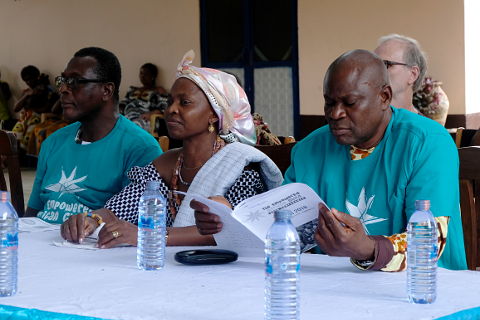 |
| Honoured guests at the opening ceremony, two wearing conference tee-shirts. From left to right: Joseph Yogah Adovor, Akatsi South District Education Director, Mama Adzorhlor III, Queen Mother of Dagbamete, and Leo Nelson Adzidoga, Akatsi South District Chief Executive. |
This year's Empowered African Child Arts Conference was held October 22-24. Over 40 primary school teachers from the South Akatsi District participated in the three day conference. Volunteers from Canada and Ghana led workshops on the use of creative arts in the classroom.
Founded by Sarina Condello, an arts educator from Toronto, Canada, and Frederick Kwasi Dunyo, a professor of African traditional drumming from York University in Toronto, the conference aimed to give primary school students in Ghana the "opportunity to express, explore, learn and become empowered" through a curriculum that prominently features the creative arts.
At the opening of the conference, the district chief executive of Akatsi South district, Leo Nelson Adzidoga, said that he hoped the use of the arts as promoted at the conference will become a model for education in the district. He thanked the founders and the organizers for their roles in bringing the conference to Dagbamete.
 |
| Workshop on the use of dancing for the promotion of literacy and numeracy. |
In her keynote address, the queen mother of Dagbamete, Mama Adzorhlor III, told the teachers that they have the "most important job in the country" moulding the youth to become "the innovators of the future: the engineers, the doctors, the artists, the scientists, and the business owners who will help develop the country." Because education is a partnership between the teachers and the community, she urged the teachers to go around and get to know the parents and help them understand the importance of supporting their children's education.
Over the three days the teachers learned specific methods and tools for enhancing learning in the classroom. Among the session topics were how to use dance to teach literacy and numeracy, how to use mime to create stories through improvisation and collaboration, how to use simple crafts to develop manual dexterity and creative expression, and how to create a safe environment in the classroom using simple leadership tools that encourage children to open up and engage.
 |
| Some of the volunteers from Canada and Ghana. |
Volunteer Kofi Dunyo, a former resident of the village, said that the conference was "uplifting and inspiring because it gave me hope progress is in the works in Ghana." Dunyo, who emigrated to Canada 10 years ago, said that he was thrilled that Ghanaians are open to seeing a different perspective for education and for dealing with children. "That's progress," he said.
"Watching women [teachers] with babies come to the conference was an inspiration," Dunyo added. And watching "mature adults unleash the child inside was beautiful."
Bailey Davis Dunyo, one of the organizers from Canada, praised how the teachers "really embraced the program and were so excited about these new concepts, so interested in everything we were teaching." She enthused that the teachers were already coming up with ideas how they can incorporate the program into their classrooms. "It was real collaboration, which ultimately made the conference that much richer."
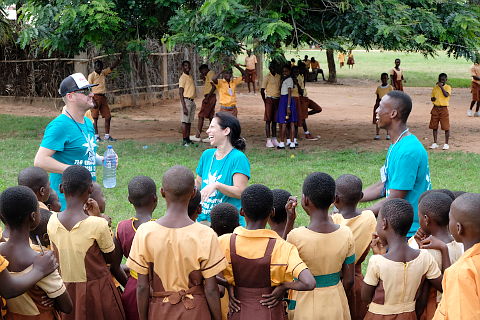 |
| With the kids at a workshop on the use of play to promote creativity. |
The conference was the third of five annual conferences that the founders Sarina Condello and Frederick Kwasi Dunyo have committed to holding in Dagbamete. It is hoped that, with the continued support of the local district department of education, the teachers trained in the program will become the trainers of other teachers, thereby eventually expanding the scope of the program beyond the district and across the Volta Region and even across the country.
The conference received financial and organizational support from the Canadian charities, Childhood Now and the Big Little Caravan of Joy.
[Photos by Kofi Dunyo.]
Torgbui Sri Cautions Against Division in Anlo State as Atsyiame Celebrates Festival
By Samuel Agbewode, The Chronicle October 24, 2018
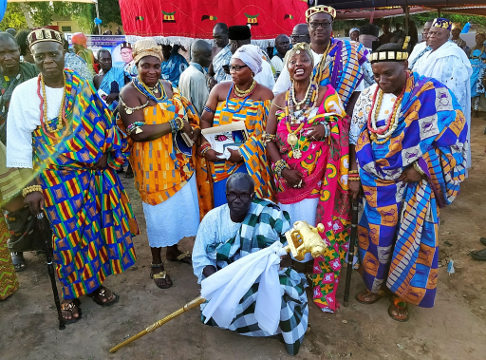 |
| Some of the chiefs and queen mothers in attendance at the 2018 Atsyiame Festival held in Dagbamete on October 20, 2018. |
DAGBAMETE - The Awoamefia of the Anlo State, Torgbui Sri III, has called for unity and peace among the people, saying it is vital for the development of every society and would only thrive in an atmosphere of peace, while cautioning against divisive tendencies which would only be a drawback.
Torgbui Sri noted that people who normally create problems in communities were driven into such divisive activities through selfishness and greed, which, he said, should be guarded against so as to ensure a peaceful environment that would help the people to carry out planned development activities that would improve their living standards.
Speaking at the 5th Atsyiame 'Tutuza' (Development Festival) at Dagbamate in the Akatsi South District, the Overlord of the Anlo State reminded the people, and all Anlos, to be guided by the fact that they were all one people, irrespective of the various traditional areas they belong to, and should never do anything that would destroy the long-existing culture and values that bind them together as one people.
Torgbui Sri, at this point, expressed regret that it was very unfortunate that some Anlo people were sadly breaking away from their roots, claiming that they did not belong to Anlo, and asked that such divisive practices should stop, since that would not help in the development efforts of Anlo.
The Awoamefia continued that the culture of Anlo, since the time of migration from their ancestral home in Notse, did not change.
He further added that, for instance, the cultural practices of the Anlos still remain as their simplest way of identification, saying the Anlo State is a unique one with a special culture and traditional practices, and "we cannot forcefully divide ourselves."
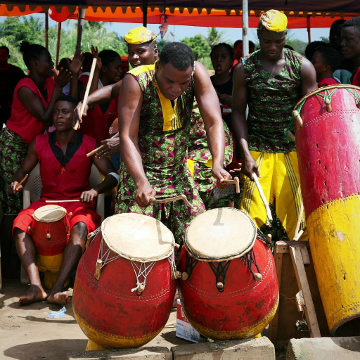 |
| Drummers performing at this year's Atsyiame Festival. |
A former Speaker of Parliament and an elder of Atsyiamedukor, Rt. Hon. Doe Adzaho, thanked the Awoamefia for making it known publicly that he (Awoamefia) elevated Torgbui Samlafo IV to the status of Paramount Chief of Atsyiame, because he (Adzaho) was criticised for interfering in the chieftaincy issue and influencing the elevation process of Togbui Samlafo.
The former Speaker of Parliament made it clear that he is not a chief, and would not be involved in chieftaincy matters, as the people were made to understand when Togbe Samlafo was made the Paramount Chief of Atsyiame in 2014, and reassured the people that he would not do anything that would destroy the unity and peace of the area.
Rt. Hon. Adzaho said he would, however, commit himself to development activities in the area, including the celebration of the festival, which is aimed at mobilising both material and human resources for the development of Atsyiamedukor, and recounted that the first Atsyiame Tutuza saw the establishment of an education endowment fund to support brilliant but needy children in the area.
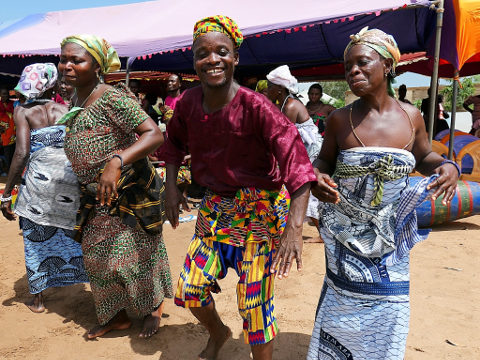 |
| Dancers performing in Dagbamete at the Atsyiame Festival. |
The Paramount Chief of the Atsyiame Traditional Area, Torgbui Samlafo IV, said the development and well-being of the youth is being taken as a project by Atsyiamedukor, which relates to education, job creation and control of social vices.
He mentioned drunkenness, smoking, and robbery among others as some of the vices that were destroying the youth, stressing that parents and traditional rulers have crucial roles to play in addressing the menace, urging them (chiefs) to develop bye-laws for their respective communities to check such behaviours.
Togbui Samlafo used the occasion to commend the government on the free Senior High School policy (SHS), which he described as a laudable idea, and called on all stakeholders to assist to overcome the implementation challenges.
He added that the One District, One Factory initiative was equally a good policy, and when fully implemented, would bring great relief to the youth.
The Paramount Chief of Atsyiame also called for the removal of outmoded customs such as keeping the dead in the morgue for months, expensive funerals, building houses, and buying of clothes for the dead ought to be stopped, and such monies used to cater for the needs of children, particularly, to support them in school.
The Chief of Dagbamate, Togbui Klu Agudzeamega II, called for unity and peace in the area, stressing that it was only when the chiefs and the people promote unity, that development activities in the area would thrive, while cautioning detractors to change their attitudes, because, in the past, wars were fought, but today, the common war being fought was targeted at poverty, illiteracy and disease.
[Photos by Emma Richter added.]
Deputy Volta Regional Minister Dedicates Rebuilt School Block
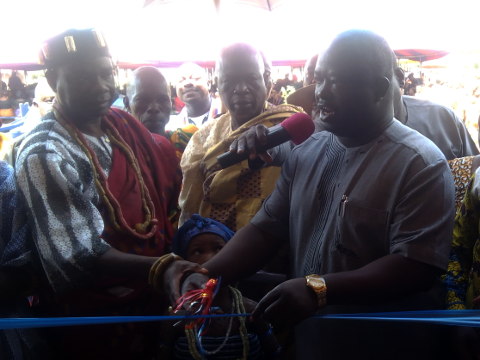 |
| Deputy Volta regional minister Maxwell Blagogee, right, cuts the ribbon at a dedication ceremony to reopen the Dagbamate school block. The school block was damaged in a violent wind storm in 2016. To his left is Togbui Samlafo IV, paramount chief of the Atsyiame traditional area and Kofi Moses Davor, acting chief of Dagbamete. |
At a dedication ceremony held on the school grounds of Dagbamete, the deputy regional minister of the Volta region marked the reopening of a primary school block that was severely damaged by a violent wind storm two years ago. The ceremony was attended by dignitaries from the district of Akatsi South and from the village of Dagbamete.
The repairs were commissioned by the Volta regional minister, Dr. Achibald Yaw Letsa, with funding from the regional government. A plaque marking the occasion was unveiled by deputy Volta regional minister, Maxwell Blagogee, on behalf of Dr. Letsa who was not able to attend.
The completion of the repair work allowed students and teachers to move back from makeshift outdoor classes that were set up in the wake of the storm.
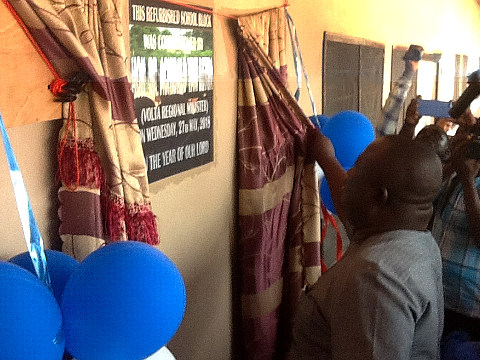 |
| Deputy regional minister Blagogee unveils a plaque to mark the Volta regional government's role in the reopening of the school block. |
The badly cracked walls of the school block had to be strengthened or rebuilt and a new roof was installed. At one point the damage seemed so severe that it was believed that the school block had to be torn down and rebuilt from the ground up. However engineers decided that the walls were sound enough that a complete rebuild was not necessary. Structurally the building is now stronger than before and will better withstand similar wind storms in the future.
In attendance at the ceremony outside the rebuilt school block was the district chief executive of Akatsi South, Leo Nelson Adzidoga, who spoke to the gathering. Also attending was the director of education for the district, Yogah Adovor. Representing the people of the area were Torgbui Samlafo IV, paramount chief of the Atsyiame traditional area, and Kofi Moses Davor, acting chief of Dagbamate. The elders of the village were also present, as well as the headmaster, the teachers and the students of the school.
The village of Dagbamete has long recognized the importance of education for the future of its children. In the aftermath of the storm the elders and the chief of Dagbamete, Torgbui Klu Agudzeamegah II, quickly mobilized to lobby the government to act. When it appeared that the government was not moving fast enough, the village began a campaign to raise funds through donations. But the lobbying did not end and ultimately efforts paid off, and the government came through with funding for the project.
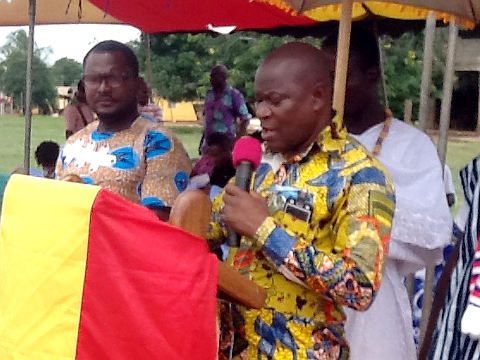 |
| District chief executive of Akatsi South, Leo Nelson Adzidoga, speaks to the assembled guests. |
A separate two story block for junior secondary classes located on the same school grounds was unaffected by the wind storm but remains unfinished — and a sore point for the village. Supported by a donor from America, construction began more than a decade ago but was never completed when funding dried up. The structure has no roof and no windows or doors, and some walls are incomplete.
The government at one time committed to put a roof on the building once the basic structure was complete. It is unclear whether that commitment still stands. For now, the project awaits a new donor or donors to resume construction. If no donor materialises then the village shrine may eventually fund the completion of the building according to Professor Kwasi Dunyo, an elder of the village who helped organized the project.
[Posted November 10, 2018]
Rawlings Urges Respect, Value for Ghana's Water Bodies at Dagbamete Festival
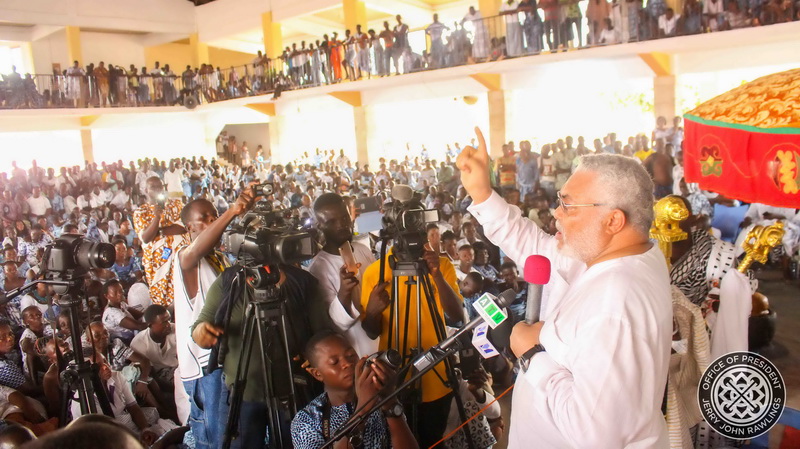 |
| Former president Rawlings addresses the congregation at the Apetorku Shrine. |
Former president Jerry John Rawlings has called for a renewed sense of sanitation, value and respect for the country's water bodies.
He also called on drivers to drive carefully on the roads and endeavour to maintain their cars to avoid preventable vehicle crashes.
Mr. Rawlings said the dumping of refuse, faeces and open defecation in our water bodies was a clear lack of respect and value for our water bodies which also serve as a source of direct drinking water for many.
Speaking at the annual festival of the chiefs and people of Dagbamete to celebrate the revered Apetorku on Sunday, Mr. Rawlings said: "The most important resource for survival is clean air, the second most important is water. I have on several occasions advocated the need for us to take care of water bodies but some of us are simply incorrigible. We do not see the honour of God in the water we have at our disposal. The spirit of God is in both air and water."
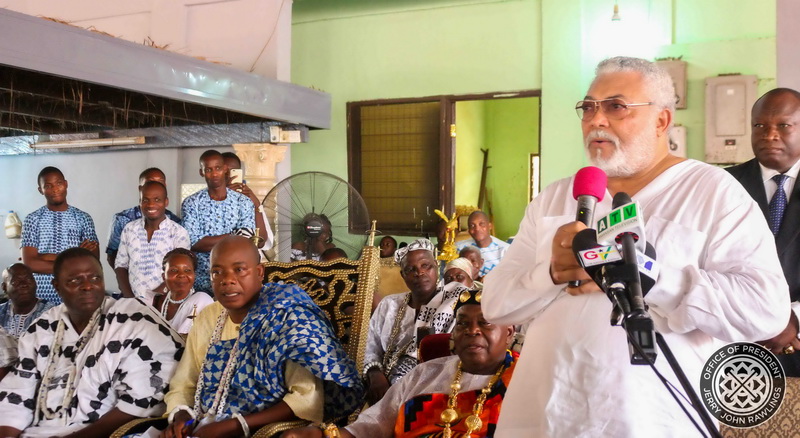 |
| Rawlings speaking at the Apetorku Shrine. |
Commending the people of Ada for their reverence for their water bodies, former president Rawlings stated that a party organizer recently informed him that the people of Ada do not wash, bathe or dump rubbish in the Volta River.
"They have so much reverence for their water body because they drink directly from it. Unfortunately the people of Ada are at the very end of the lengthy river, which carries downstream, all the rubbish and filth dumped upstream. They should probably be up there where it's cleaner but they are at the receiving end.
"If one is seen spitting into the water it means that person is a stranger. If people want to wash they fetch water from the river to do so. They don't wash in the river. All visitors are compelled to live by their norms," the former president said.
Mr. Rawlings also commended the people of Dagbamete for their sense of cleanliness saying he accepted the invitation to attend the festival because of the social sense of responsibility, discipline and self-help initiatives that the people of Dagbamete are known for.
The former president also called on drivers to always drive carefully and regularly maintain their vehicles, including checking the quality of their vehicle tyres. He informed the gathering that he had received assurances from the Interior Minister that plans were afoot to start prosecuting people for irresponsible driving that kills and maims people.
"When we leave here we should drive carefully. When you are tired or you refuse to check your tyres and there is an accident you shouldn't say it is the doing of God. It is your irresponsibility. In other developed countries you will be charged for manslaughter, tried and jailed. But here in Ghana we just call it accident and leave it. Why can't we feel safe on our roads?" he asked.
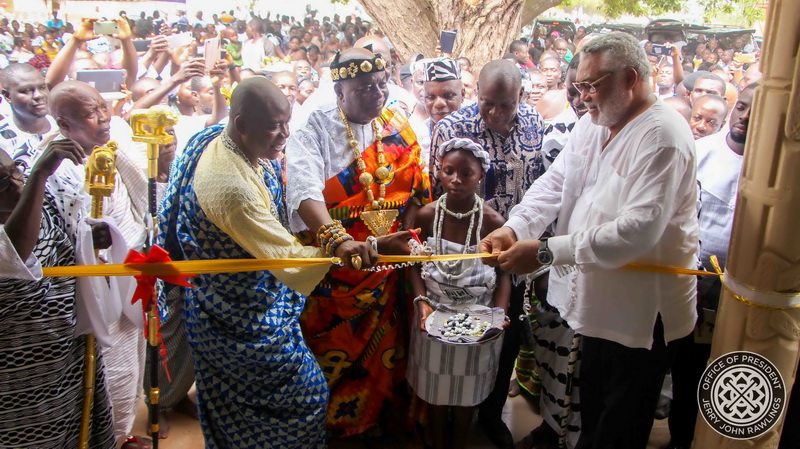 |
| President Rawlings and Togbe Sri III, Awoemefia of the Anlo Traditional Area, cut the tape to commission the new community centre. |
Flight Lieutenant Jerry John Rawlings also called for a renewed sense of family planning saying we should be responsible for all unplanned births instead of insisting it is the will of God. He indicated that family planning was a recognition of one's responsibility to himself and family and the desire to improve one's standard of living. He cautioned that if we did not manage births responsibility our population would outstrip valuable resources such as water, indicating that in places like Cape Town in South Africa and some areas of Pakistan water scarcity was already a major problem.
The former president later joined the Awoemefia of the Anlo Traditional Area, Togbe Sri III to commission a new community centre built by the people of Dagbamete.
The people of Dagbamete who are predominantly adherents of the African Traditional Religion have with the support of Apetorku Gbodzi constructed a clinic with a doctor's bungalow and nurses' quarters, a computer laboratory, teachers' quarters, a public toilet and also installed street lights over the past ten years.
"We Also Deserve a National Holiday" Says Chief of Dagbamete
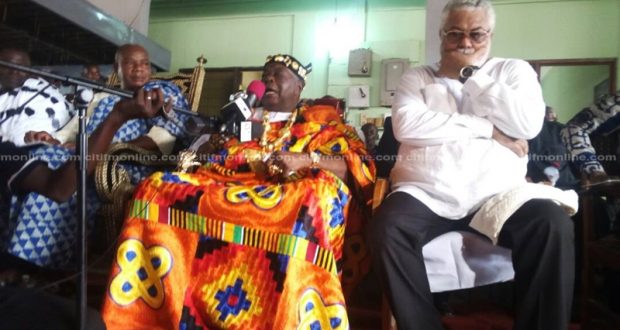 |
| Torbui Sri of Anlo State, with former president Jerry Rawlings to his left, speaking at the Apetorku Shrine during the annual Easter festival in Dagbamete. The chief of Dagbamete, Torgbui Klu Agudzeamegah II, also spoke to the shrine congregation and said African traditional religion should have a national holiday just as Christians and Muslims do. |
African traditional worshipers in the Volta Region are calling on the government to identify a holiday for such worshipers in the national calendar as it is done for Muslims and Christians.
Speaking at this year's Apetorku Festival held in Dagbamate in the Akatsi South District of the Volta Region, Chief of Dagbamate, Torgbui Klu Agudzeamegah II, said the activities of African tradition worshipers are still relevant, and must be given equal attention as a religious group.
Making a passionate appeal to the government, the Chief said the government should set aside a day in the national calendar as a holiday for the indigenous religion to commemorate important rites.
He also asked the government to restore the pouring of libation at state functions as being done by Christians and Muslims in the form of prayers.
"We at this juncture want to put the following proposals to government for consideration: government should identify a traditional holiday for the traditionalists as being done for Muslims and Christians. Since independence, pouring of libation was part of all government functions, but what we see now is Christian and Muslim Prayers only performed at government functions. We therefore want to propose that pouring of libation at national festivals/functions be re-instated" he appealed.
Dagbamate is one of the spiritual homes for most of the indigenous religions' followers in the region, where people visit the shrine for physical and spiritual healings, and for protection against evil forces.
The shrine, which is an ultra modern auditorium housing their god, Apetorku, is believed to have played significant roles in the development of the community. The shrine has branches across the country including Accra, Koforidua, Ashaiman, Ho and Denu.
The community is known for its self-help projects in areas of education, health, electricity and water supply. With little or no help from the District Assembly, the community led by the Priest constructed standard classroom blocks, hospital, bungalows for teachers and health workers among other social amenities.
The annual festival commences the evening of Easter Saturday and lasts for 8-9 days. This year's event was graced by various dignitaries including Former President JJ Rawlings, Togbui Sri of Anlo State among others.
Former President Rawlings Celebrates Apetorku Festival with the People of Dagbamete
From GBC April 3, 2018
